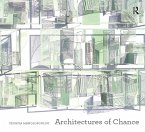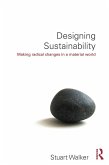42,95 €
42,95 €
inkl. MwSt.
Sofort per Download lieferbar

21 °P sammeln
42,95 €
Als Download kaufen

42,95 €
inkl. MwSt.
Sofort per Download lieferbar

21 °P sammeln
Jetzt verschenken
Alle Infos zum eBook verschenken
42,95 €
inkl. MwSt.
Sofort per Download lieferbar
Alle Infos zum eBook verschenken

21 °P sammeln
- Format: PDF
- Merkliste
- Auf die Merkliste
- Bewerten Bewerten
- Teilen
- Produkt teilen
- Produkterinnerung
- Produkterinnerung

Bitte loggen Sie sich zunächst in Ihr Kundenkonto ein oder registrieren Sie sich bei
bücher.de, um das eBook-Abo tolino select nutzen zu können.
Hier können Sie sich einloggen
Hier können Sie sich einloggen
Sie sind bereits eingeloggt. Klicken Sie auf 2. tolino select Abo, um fortzufahren.

Bitte loggen Sie sich zunächst in Ihr Kundenkonto ein oder registrieren Sie sich bei bücher.de, um das eBook-Abo tolino select nutzen zu können.
With this book as a resource, architects and designers have a handbook of technical and philosophical concepts to lend rigor to their design work.
- Geräte: PC
- ohne Kopierschutz
- eBook Hilfe
- Größe: 7.98MB
Andere Kunden interessierten sich auch für
![Virtual Aesthetics in Architecture (eBook, PDF) Virtual Aesthetics in Architecture (eBook, PDF)]() Virtual Aesthetics in Architecture (eBook, PDF)38,95 €
Virtual Aesthetics in Architecture (eBook, PDF)38,95 €![Architectures of Chance (eBook, PDF) Architectures of Chance (eBook, PDF)]() Yeoryia ManolopoulouArchitectures of Chance (eBook, PDF)61,95 €
Yeoryia ManolopoulouArchitectures of Chance (eBook, PDF)61,95 €![Designing Sustainability (eBook, PDF) Designing Sustainability (eBook, PDF)]() Stuart WalkerDesigning Sustainability (eBook, PDF)53,95 €
Stuart WalkerDesigning Sustainability (eBook, PDF)53,95 €![Infrastructure and the Architectures of Modernity in Ireland 1916-2016 (eBook, PDF) Infrastructure and the Architectures of Modernity in Ireland 1916-2016 (eBook, PDF)]() Gary A. BoydInfrastructure and the Architectures of Modernity in Ireland 1916-2016 (eBook, PDF)50,95 €
Gary A. BoydInfrastructure and the Architectures of Modernity in Ireland 1916-2016 (eBook, PDF)50,95 €![Modern Theatres 1950-2020 (eBook, PDF) Modern Theatres 1950-2020 (eBook, PDF)]() Modern Theatres 1950-2020 (eBook, PDF)69,95 €
Modern Theatres 1950-2020 (eBook, PDF)69,95 €![Architectures of Transversality (eBook, PDF) Architectures of Transversality (eBook, PDF)]() Shima MohajeriArchitectures of Transversality (eBook, PDF)42,95 €
Shima MohajeriArchitectures of Transversality (eBook, PDF)42,95 €![Capsules: Typology of Other Architecture (eBook, PDF) Capsules: Typology of Other Architecture (eBook, PDF)]() Peter SenkCapsules: Typology of Other Architecture (eBook, PDF)39,95 €
Peter SenkCapsules: Typology of Other Architecture (eBook, PDF)39,95 €-
-
-
With this book as a resource, architects and designers have a handbook of technical and philosophical concepts to lend rigor to their design work.
Dieser Download kann aus rechtlichen Gründen nur mit Rechnungsadresse in A, B, BG, CY, CZ, D, DK, EW, E, FIN, F, GR, HR, H, IRL, I, LT, L, LR, M, NL, PL, P, R, S, SLO, SK ausgeliefert werden.
Produktdetails
- Produktdetails
- Verlag: Taylor & Francis eBooks
- Seitenzahl: 208
- Erscheinungstermin: 20. November 2019
- Englisch
- ISBN-13: 9781317266556
- Artikelnr.: 58279016
- Verlag: Taylor & Francis eBooks
- Seitenzahl: 208
- Erscheinungstermin: 20. November 2019
- Englisch
- ISBN-13: 9781317266556
- Artikelnr.: 58279016
- Herstellerkennzeichnung Die Herstellerinformationen sind derzeit nicht verfügbar.
Heather Renée Barker, Associate Professor of Design at California State University Long Beach, USA develops her work through the integration of research and practice. She is founding coordinator of the graduate Human Experience Design Interactions (MA_HXDI) program and the Immersive Design Research Lab and has served the city of Long Beach, California as Design Lead for the Bloomberg Philanthropies' funded Innovation Team (i-team) and as Design Strategy Lead for the Office of Civic Innovation.
Introduction - "How exactly, do I design?"
Pillar 01 - Discover / Epoché
Terminology (lexis) of human-centered design practice.
Introduction
Language is Code and Language is Strategy.
DISCOVER
Behavioral Science / Biology / Physics
Experience / Perception / Science Fiction / Space
Define
Artificial Intelligence / Learning Theory
Complexity Theory / Game Theory
Film Theory / Linguistics / Semiotics
Develop
Anthropology / Sociology
Mathematics / Philosophy / Poetry
Deliver
Architecture / Computer Science
Design / Design Thinking / Strategy
Pillar 02 - Define / Phenomenological Reduction
Methodologies that define design practice.
Introduction
Building Methodologies:
Experience Design / Process Constructive (XD/PC) Theoretical Framework
Pragma-Phenome Theory Statement
Pillars of the Applied Experience Design / Process Constructive Theoretical
Framework
Design Assets, Value Creation and Evaluation Criteria
Semantic Consistency and Alignment between Theory and Strategy
Development of the Methodologies
Applying the XD/PC Methodologies
Methodologies under the Pragma-Phenome Umbrella
Choose your own methodology
Consistent across all methodologies: Building the Data Space
Gamification as a Pragmatic Measure of Engagement
From Philosophy to Project
Engage In A World-Building Design Methodology
World-Building Methodology For Big, General, Undefined Issues
Engage In A Soft Systems Design Methodology
Emphasis On Systems.
Engage In An Imagist Design Methodology
Emphasis On Value.
Engage In A Pragmatist Design Methodology
Emphasis On Objects & Action.
Four Phases of the Pragma-Phenome Design Process Methodologies.
Self-Similar Phases of the Pragma-Phenome Design Process Methodologies.
Phase 01 Discover & Analyze - Epoché
Phase 02 Define & Contextualize - Phenomenological Reduction
Phase 03 Develop & Implement - Eidetic Variation
Phase 04 Deliver & Measure - Intersubjective Corroboration
Summary of Methodologies
Systemized Processes of Design Praxis
Pillar 03 - Develop / Eidetic Variation
Abstracted Principles, Generalized, and Prototyped in Practice
Case-Studies
Introduction
Methodologies as Applied to Case-Studies
World-Building Methodology (Space for Everyone Virgin Orbit)
Soft Systems Design Methodology (Urban Public Safety)
Imagist Methodology (Mobility: MC2 / 2028 Olympics / Toyota)
Pillar 01 - Discover / Epoché
Terminology (lexis) of human-centered design practice.
Introduction
Language is Code and Language is Strategy.
DISCOVER
Behavioral Science / Biology / Physics
Experience / Perception / Science Fiction / Space
Define
Artificial Intelligence / Learning Theory
Complexity Theory / Game Theory
Film Theory / Linguistics / Semiotics
Develop
Anthropology / Sociology
Mathematics / Philosophy / Poetry
Deliver
Architecture / Computer Science
Design / Design Thinking / Strategy
Pillar 02 - Define / Phenomenological Reduction
Methodologies that define design practice.
Introduction
Building Methodologies:
Experience Design / Process Constructive (XD/PC) Theoretical Framework
Pragma-Phenome Theory Statement
Pillars of the Applied Experience Design / Process Constructive Theoretical
Framework
Design Assets, Value Creation and Evaluation Criteria
Semantic Consistency and Alignment between Theory and Strategy
Development of the Methodologies
Applying the XD/PC Methodologies
Methodologies under the Pragma-Phenome Umbrella
Choose your own methodology
Consistent across all methodologies: Building the Data Space
Gamification as a Pragmatic Measure of Engagement
From Philosophy to Project
Engage In A World-Building Design Methodology
World-Building Methodology For Big, General, Undefined Issues
Engage In A Soft Systems Design Methodology
Emphasis On Systems.
Engage In An Imagist Design Methodology
Emphasis On Value.
Engage In A Pragmatist Design Methodology
Emphasis On Objects & Action.
Four Phases of the Pragma-Phenome Design Process Methodologies.
Self-Similar Phases of the Pragma-Phenome Design Process Methodologies.
Phase 01 Discover & Analyze - Epoché
Phase 02 Define & Contextualize - Phenomenological Reduction
Phase 03 Develop & Implement - Eidetic Variation
Phase 04 Deliver & Measure - Intersubjective Corroboration
Summary of Methodologies
Systemized Processes of Design Praxis
Pillar 03 - Develop / Eidetic Variation
Abstracted Principles, Generalized, and Prototyped in Practice
Case-Studies
Introduction
Methodologies as Applied to Case-Studies
World-Building Methodology (Space for Everyone Virgin Orbit)
Soft Systems Design Methodology (Urban Public Safety)
Imagist Methodology (Mobility: MC2 / 2028 Olympics / Toyota)
Introduction - "How exactly, do I design?"
Pillar 01 - Discover / Epoché
Terminology (lexis) of human-centered design practice.
Introduction
Language is Code and Language is Strategy.
DISCOVER
Behavioral Science / Biology / Physics
Experience / Perception / Science Fiction / Space
Define
Artificial Intelligence / Learning Theory
Complexity Theory / Game Theory
Film Theory / Linguistics / Semiotics
Develop
Anthropology / Sociology
Mathematics / Philosophy / Poetry
Deliver
Architecture / Computer Science
Design / Design Thinking / Strategy
Pillar 02 - Define / Phenomenological Reduction
Methodologies that define design practice.
Introduction
Building Methodologies:
Experience Design / Process Constructive (XD/PC) Theoretical Framework
Pragma-Phenome Theory Statement
Pillars of the Applied Experience Design / Process Constructive Theoretical
Framework
Design Assets, Value Creation and Evaluation Criteria
Semantic Consistency and Alignment between Theory and Strategy
Development of the Methodologies
Applying the XD/PC Methodologies
Methodologies under the Pragma-Phenome Umbrella
Choose your own methodology
Consistent across all methodologies: Building the Data Space
Gamification as a Pragmatic Measure of Engagement
From Philosophy to Project
Engage In A World-Building Design Methodology
World-Building Methodology For Big, General, Undefined Issues
Engage In A Soft Systems Design Methodology
Emphasis On Systems.
Engage In An Imagist Design Methodology
Emphasis On Value.
Engage In A Pragmatist Design Methodology
Emphasis On Objects & Action.
Four Phases of the Pragma-Phenome Design Process Methodologies.
Self-Similar Phases of the Pragma-Phenome Design Process Methodologies.
Phase 01 Discover & Analyze - Epoché
Phase 02 Define & Contextualize - Phenomenological Reduction
Phase 03 Develop & Implement - Eidetic Variation
Phase 04 Deliver & Measure - Intersubjective Corroboration
Summary of Methodologies
Systemized Processes of Design Praxis
Pillar 03 - Develop / Eidetic Variation
Abstracted Principles, Generalized, and Prototyped in Practice
Case-Studies
Introduction
Methodologies as Applied to Case-Studies
World-Building Methodology (Space for Everyone Virgin Orbit)
Soft Systems Design Methodology (Urban Public Safety)
Imagist Methodology (Mobility: MC2 / 2028 Olympics / Toyota)
Pillar 01 - Discover / Epoché
Terminology (lexis) of human-centered design practice.
Introduction
Language is Code and Language is Strategy.
DISCOVER
Behavioral Science / Biology / Physics
Experience / Perception / Science Fiction / Space
Define
Artificial Intelligence / Learning Theory
Complexity Theory / Game Theory
Film Theory / Linguistics / Semiotics
Develop
Anthropology / Sociology
Mathematics / Philosophy / Poetry
Deliver
Architecture / Computer Science
Design / Design Thinking / Strategy
Pillar 02 - Define / Phenomenological Reduction
Methodologies that define design practice.
Introduction
Building Methodologies:
Experience Design / Process Constructive (XD/PC) Theoretical Framework
Pragma-Phenome Theory Statement
Pillars of the Applied Experience Design / Process Constructive Theoretical
Framework
Design Assets, Value Creation and Evaluation Criteria
Semantic Consistency and Alignment between Theory and Strategy
Development of the Methodologies
Applying the XD/PC Methodologies
Methodologies under the Pragma-Phenome Umbrella
Choose your own methodology
Consistent across all methodologies: Building the Data Space
Gamification as a Pragmatic Measure of Engagement
From Philosophy to Project
Engage In A World-Building Design Methodology
World-Building Methodology For Big, General, Undefined Issues
Engage In A Soft Systems Design Methodology
Emphasis On Systems.
Engage In An Imagist Design Methodology
Emphasis On Value.
Engage In A Pragmatist Design Methodology
Emphasis On Objects & Action.
Four Phases of the Pragma-Phenome Design Process Methodologies.
Self-Similar Phases of the Pragma-Phenome Design Process Methodologies.
Phase 01 Discover & Analyze - Epoché
Phase 02 Define & Contextualize - Phenomenological Reduction
Phase 03 Develop & Implement - Eidetic Variation
Phase 04 Deliver & Measure - Intersubjective Corroboration
Summary of Methodologies
Systemized Processes of Design Praxis
Pillar 03 - Develop / Eidetic Variation
Abstracted Principles, Generalized, and Prototyped in Practice
Case-Studies
Introduction
Methodologies as Applied to Case-Studies
World-Building Methodology (Space for Everyone Virgin Orbit)
Soft Systems Design Methodology (Urban Public Safety)
Imagist Methodology (Mobility: MC2 / 2028 Olympics / Toyota)







